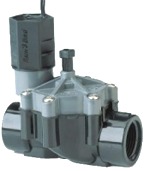Sprinkler valve
A sprinkler valve is the next step up from a ball valve, and is a commercially produced diaphragm valve. These electrically activated valves are used to control sprinklers in automatic lawn watering systems. Sprinkler valves are usually available at well stocked hardware stores and typical cost $10 to $20 depending on their capacity.
The valve is operated by applying 9 to 24 volts (they are designed for 24V) to the solenoid which opens the valve.
Unfortunately for spuders, sprinkler valves are designed to open relatively slowly to prevent "water hammer". The large number of internal turns decreases the flow of the valve to roughly 60-70% of a piston/diaphragm valve with the same diameter.
The performance can be improved by replacing the stock solenoid-valve vent with a pilot valve with more flow. Most often this is a blow gun, although for larger valves a ball valve or even a smaller sprinkler valve can be used. This operation is often called modding the valve.
You can download a video of how to modify a sprinkler valve here
The GGDT's website has valve data for sprinklers in it's design library
Stock, electrically activated sprinkler valves can be fired remotely using very simple electronics, check out the remotely activated valve tutorial.
Troubleshooting
If you are having problems with your sprinkler valve, these are some things to try
Valve "Honks" or "sounds like an airhorn"
You need a larger pilot valve. For more information, see honking.
Valve won't seal
If your valve leaks air out the barrel there is a good chance that there is dirt, PVC shavings etc. in the valve preventing it from closing properly. An easy way to clean the valve it to just hook it up to a hose and flush water through it while cycling the valve a few times. If that doesn't fix the problem then you should disassemble the valve and clean the diaphragm and seat. Check for any plastic chips that may have entered the valve. Smear the diaphragm and seat with lithium grease to promote a seal.
For other problems, visit the Sprinkler Valve Troubleshooting Guide [1]
